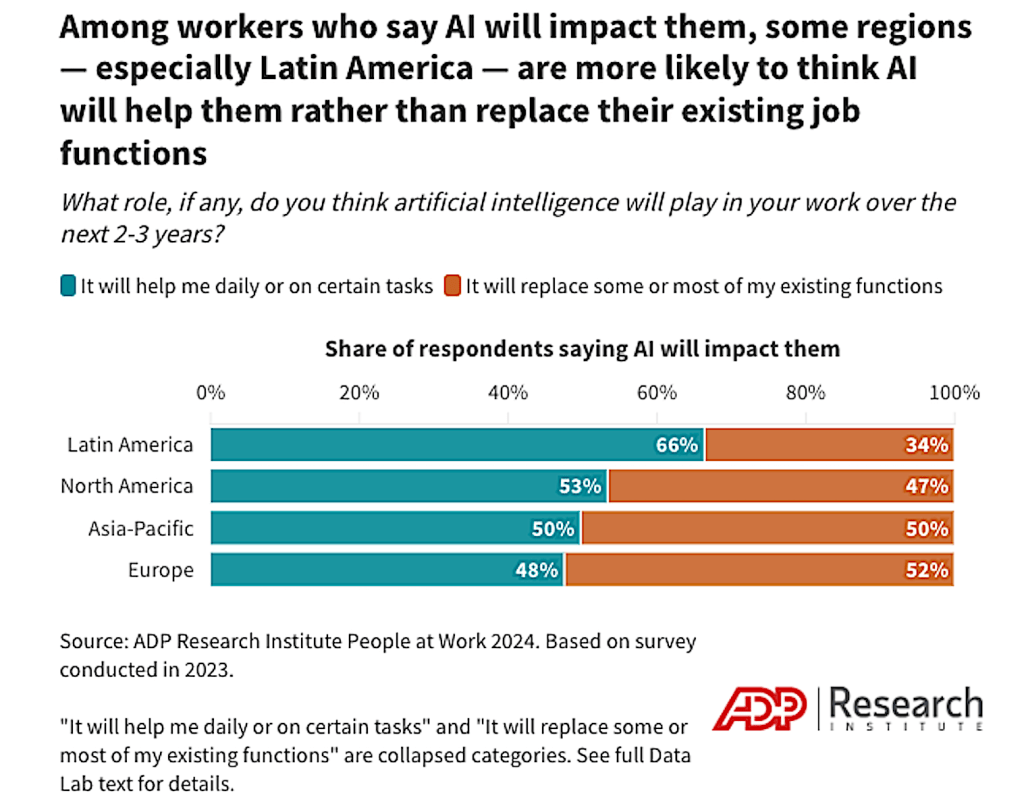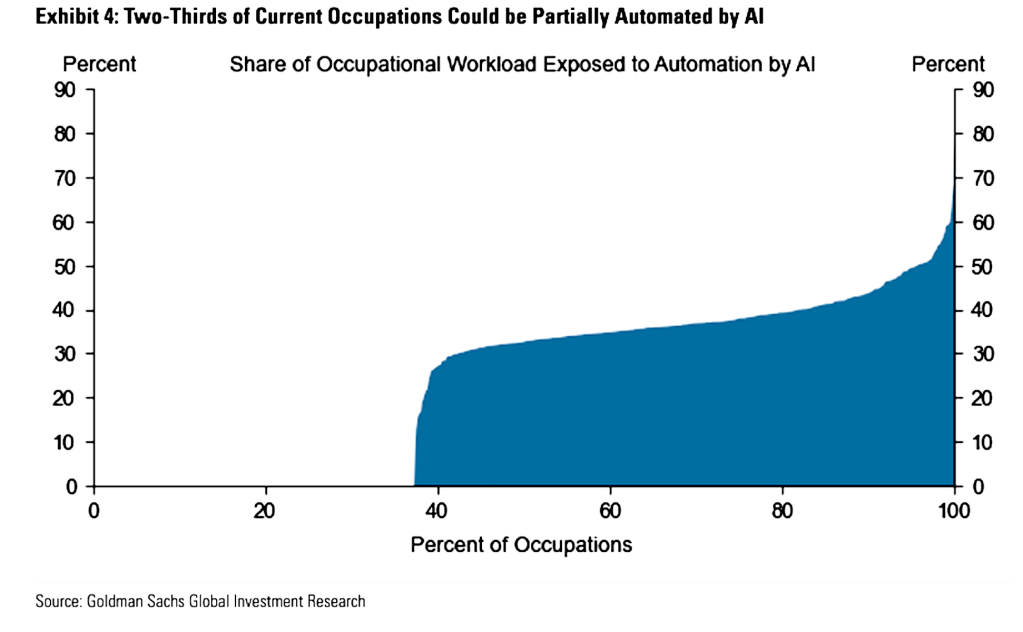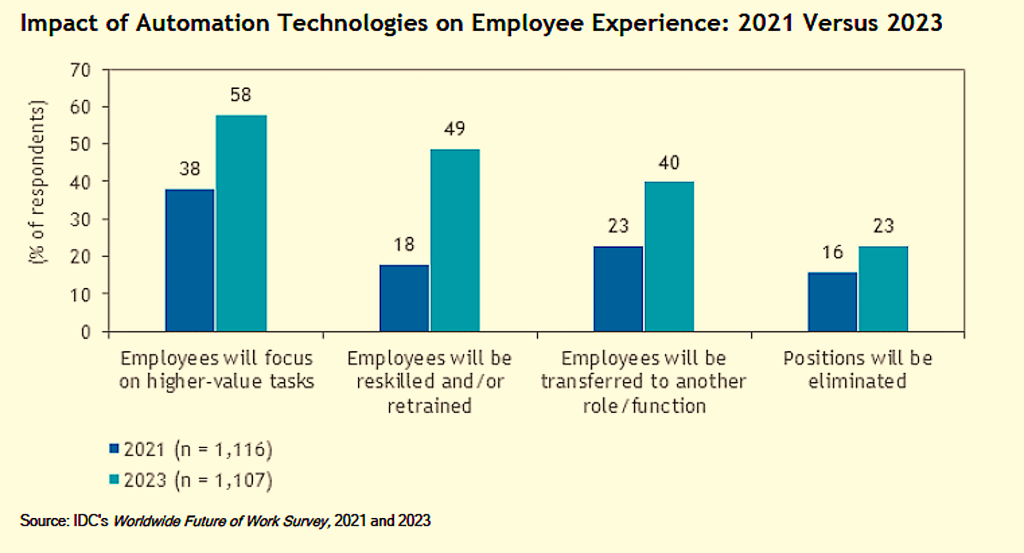Knowlege workers are worried AI automation will replace them, according to a new survey.

More than four in 10 workers in a massive, global survey said they're threatened by the increasing presence of artificial intelligence (AI) in their workplace.
Responses to an ADP survey from nearly 35,000 workers in 18 countries explored new challenges and technologies reshaping the labor market. Among the top concerns: AI, with 42% citing it as a job threat.
Data and an evaluation of the results by ADP focused on how workers' priorities, expectations and feelings have shifted, including their sense of job security and how the implementation of AI in the workplace impacts that shift. The details are included in ADP's recently released "People At Work 2024: A Global Workforce View" annual report.
Eighty-five percent of workers believe AI will impact their job in the next two to three years, ADP's survey found. Among workers who say AI will help them every day, 70% say they have the skills they need to advance their career to the next level within three years. Of those who say AI will replace most of their existing functions, only 45% think they have the skills they need.

ADP
Workers in some ways have remained constant in their priorities; they still put great value on financial compensation and job security, for example. In other ways, however, they feel under siege from technology, stress, and changing workplace norms. ADP's report this year focused on a "Great Transition" from a "troubled, pandemic-driven economy to a post-pandemic world."
Overall, people feel better about their job security than they did a year ago, but they're now worried by the increasing presence of AI.
The survey results are backed by financial services market predictions that AI could replace the equivalent of 300 million full-time jobs. According to a 2023 report by investment bank Goldman Sachs, two-thirds of all jobs could be partially automated by AI. "If generative AI delivers on its promised capabilities, the labor market could face significant disruption," Goldman reported. "And... generative AI could substitute up to one-fourth of current work."
In the US, office and administrative support jobs face the highest risks, with 46% of those jobs facing automation by AI, according to Goldman Sachs. That figure is 44% for legal work and 37% for tasks within architecture and engineering.
"The good news is that worker displacement from automation has historically been offset by creation of new jobs, and the emergence of new occupations following technological innovations accounts for the vast majority of long-run employment growth," Goldman Sachs noted. "The combination of significant labor cost savings, new job creation, and higher productivity for non-displaced workers raises the possibility of a productivity boom that raises economic growth substantially, although the timing of such a boom is hard to predict."

Goldman Sachs
Goldman's report suggested genAI could raise annual US labor productivity growth by just under 1.5% over a 10-year period after widespread adoption, although the boost could be much smaller or larger depending on the difficulty level of tasks AI will be able to perform and how many jobs are automated.
Of the ADP survey respondents, 17% said AI has the power to make their work easier and were less likely to feel insecure about losing their jobs. And 43% think having AI on the job will be a good thing.
While most (60%) agree they have the skills needed to advance their career in the next three years, less than half (47%) feel their employer invests in the skills they need to grow professionally. As workers grow less confident in their employers' willingness or ability to invest in them, however, they grow more concerned about AI muscling in on their jobs. Workers who most fear AI have the least confidence (45%) that they have the skills they'll need.
A widening IT skills shortage is dogging organizations in all industries and across all regions, IDC research shows. But far from eliminating most jobs, AI is expected to boost the productivity of the existing workforce and help to create new roles.

IDC
"For all the concern about job loss..., many AI-based changes to work have led to new job opportunities, including enabling workers to focus on more engaging and innovative tasks," IDC' said. "AI use cases are creating new opportunities for content creation, education, entertainment, and content generation, provoking a shift in thinking about the role of AI on jobs and roles.
IDC data indicates that 32% of business and IT leaders now expect advancing AI constructs such as genAI to save time and improve productivity. For example, genAI tools support greater access to diverse knowledge resources by enabling employees to conversationally access them using natural language queries.
"GenAI and skills are increasingly tightly related: Organizations spanning all industries and geographies face a widening shortage of all IT tech skills, regardless of those skills relating to security, cloud, IT service management, or AI itself," IDC said. "GenAI tools used in conjunction with or inside of tech training platforms can and do accelerate training."
Nearly two-thirds (62%) of about 1,100 IT leaders surveyed earlier this year told IDC that a lack of skills has resulted in missed revenue growth objectives - and more than 60% say it has led to quality problems and a loss of customer satisfaction. IDC predicts that by 2026, more than 90% of organizations worldwide will feel similar pain, amounting to some$5.5 trillion in losses caused by product delays, impaired competitiveness, and loss of business.
"There is no escaping it: The time to plan for AI skills and roles is now. ...The question is not whether enterprises must skill up employees for the age of AI, but when and how they will do it," IDC wrote in its report.
At the same time, many organizations are still asking whether the rapidly evolving technology will profoundly change jobs and skills development at a fundamental level. "Automation has long impacted human activities, most notably during the industrial era when machines rapidly replaced the manual work of humans," IDC said.
The impact of AI and genAI varies by profession and industry, with creative and engagement-based skill sets and work being affected first. Marketers, customer support teams, web designers, professional services groups, healthcare roles, and many other positions are already seeing changes in their work practices from AI.
The same IDC data shows that 29% of business and IT leaders expect AI and genAI to enable faster decision timing for back-office centers of leadership like HR, operations, and finance. As compared to two years ago, businesses are changing their narratives around AI enablement to see what it can do for the business and its workforce rather than worrying about what uncontrollable challenges it could pose.

 English
English Pусский
Pусский Français
Français Español
Español Português
Português
































 Etiquetas calientes:
Etiquetas calientes:
